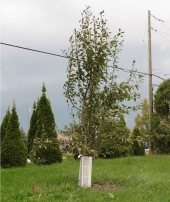








'Science is the father of knowledge, but opinion breeds ignorance.' - Hippocrates
 1
1









Works at a residential alternative high school in the Himalayas SECMOL.org . "Back home" is Cape Cod, E Coast USA.




Rebecca Norman wrote:I don't know if this would be useful in other places, but it is a very popular technique in Ladakh, where there are lots of voracious goats and not much forage, so trees need to be protected very VERY well. In Ladakh, when people have to plant trees out in the unprotected outdoors, not inside an enclosure, they collect old tin cans, cut both ends off, and run those around the trunks. Since we're mostly planting willows and poplars, which can be planted as simple cuttings, it is very easy because there are no branches so you can just plop them over the top after you've planted the cuttings. We plant cuttings at least four feet high so you can leave the top uncovered but it will be out of reach of browsing animals.
http://bigsmallfarm.org/ - non-profit farm incubator - currently accepting applications





 1
1




Works at a residential alternative high school in the Himalayas SECMOL.org . "Back home" is Cape Cod, E Coast USA.




"You must be the change you want to see in the world." "First they ignore you, then they laugh at you, then they fight you, then you win." --Mahatma Gandhi
"Preach the Gospel always, and if necessary, use words." --Francis of Assisi.
"Family farms work when the whole family works the farm." -- Adam Klaus
 1
1




short films and small works on living regeneratively at http://appleturnover.tv




elisa rathje wrote:we just use scrap wire mesh but i love the tin can suggestion! my only concern is that it could get really hot? ...
Melding permaculture, homesteading, bau-biologie, holistic oncology nutrition and functional medicine since 1997. https://nutritional-solutions.me/onco.




Jeanne Wallace wrote:
Paint the cans white with a non-toxic paint like chalk paint. Its very sturdy outdoors and adheres well to metal with no prep (can even be used on outdoor furniture).
The white would reflect light and keep the tree trunk from overheating.
short films and small works on living regeneratively at http://appleturnover.tv





 1
1




elisa rathje wrote:
good point! i have been a huge fan of chalk paint but recently made the galling discovery that like most paints (and i want to know exceptions and recipes…milk paint?) it contains polymer, as in, plastic, so the microplastic shedding is disappointingly real.
i do occasionally buy a canned tomato which is in a white can…
thanks jeanne!
 1
1








Ela La Salle wrote:
elisa rathje wrote:
good point! i have been a huge fan of chalk paint but recently made the galling discovery that like most paints (and i want to know exceptions and recipes…milk paint?) it contains polymer, as in, plastic, so the microplastic shedding is disappointingly real.
i do occasionally buy a canned tomato which is in a white can…
thanks jeanne!
I've found this information....
You could use lime milk for whitewashing fruit trees .
Such lime should be dissolved in water in the amount of 2 kg per 10 l of water. So that lime is not washed away too quickly from tree trunks during rain, it is worth adding substances that improve its adhesion (a little clay or cowberry to it)
short films and small works on living regeneratively at http://appleturnover.tv

|
I have begun to write a book. I already have all the page numbers done! And one tiny ad:
Rocket Mass Heater Resources Wiki
https://permies.com/w/rmh-resources
|





